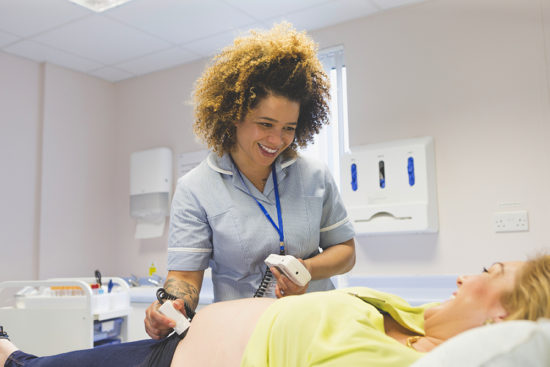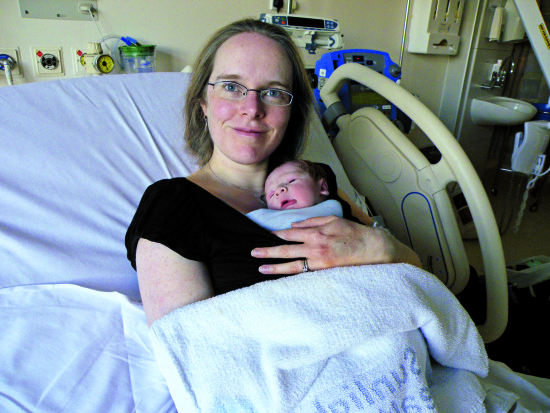We look at the signs and symptoms of pre-eclampsia and why it’s important to be able to spot this condition early.
Pre-eclampsia is a condition that is characterised by high blood pressure and a large amount of protein in the urine.
It affects around 1 in 10 pregnant women in the UK and usually happens in the second half of pregnancy (from around 20 weeks) or soon after the baby is born.
Early signs of pre-eclampsia:
Most women only experience mild symptoms, but it’s important to recognise the condition in case severe symptoms or complications develop.
Generally, the earlier pre-eclampsia develops the more severe the condition will be.
It’s unlikely that you’ll notice these symptoms, but they should be picked up during your routine antenatal appointments.
If you notice any of these symptoms, seek medical advice immediately by calling your midwife, GP’s surgery or NHS 111.
In some cases, further symptoms can develop, including:
Although many cases are mild, the condition can lead to serious complications for both mum and baby if it’s not monitored and treated, such as convulsions or HELLP syndrome.
Mild pre-eclampsia affects around 1 in 10 pregnancies, and severe cases develop in about 1 in 200 pregnancies.
There are a number of things that can increase your chances of developing pre-eclampsia, such as:

Other things that can slightly increase your chances of developing pre-eclampsia include:
If you have two or more of these together, then your chances are higher.
If you’re thought to be at a high risk of developing pre-eclampsia, you may be advised to take a daily dose of low-dose aspirin from week 12 of pregnancy until your baby is born.
To support a growing baby, the placenta needs an adequate and constant supply of blood from mum. With pre-eclampsia, the placenta doesn’t get enough blood. It’s not fully understood why this happens, but it is thought to involve the placenta not implanting properly during the first half of pregnancy.
This problem with the placenta means the blood supply between mum and baby is disrupted. This leads to signals or substances from the placenta, which affect mum’s blood vessels, causing high blood pressure (hypertension).
At the same time, problems in the kidneys may result in protein being found in the urine (proteinuria).
If you’re diagnosed with pre-eclampsia, you should be referred for an assessment by a specialist, usually in hospital. You’ll be monitored closely to determine how severe the condition is and whether a hospital stay is needed.
The only way to treat pre-eclampsia is to deliver the baby.
The only way to treat pre-eclampsia is to deliver the baby, so women will usually be monitored regularly until it’s safe for their baby to be born. This will normally be at around 37-38 weeks of pregnancy, but it may be earlier in more severe cases.
At this point, labour may be induced or women may be offered a caesarean section.
Medication may be recommended to lower mum’s blood pressure while waiting for labour to be induced or for a c-section.
Although pre-eclampsia usually improves soon after baby is born, complications can sometimes develop a few days later. Women may need to stay in hospital after birth so they can be monitored.

Babies may also need to be monitored and stay in a hospital’s neonatal intensive care unit (NICU) if they were born prematurely.
These units have staff and facilities that can help keep premature babies warm, safe and free from infection. Parents can visit the unit, help to provide care and express breastmilk for their baby.
Once it’s safe to do so, parents will be able to take their newborn home. Women who have experienced pre-eclampsia will usually need to have their blood pressure checked regularly after leaving hospital, and they may need to continue taking medication to lower their blood pressure for several weeks.
NCT’s helpline offers practical and emotional support in all areas of pregnancy, birth and early parenthood: 0300 330 0700.
You might find attending one of NCT’s Early Days groups helpful as they give you the opportunity to explore different approaches to important parenting issues with a qualified group leader and other new parents in your area.
Make friends with other parents-to-be and new parents in your local area for support and friendship by seeing what NCT activities are happening nearby.
The Preeclampsia Foundation is a non-profit organisation that works towards reducing maternal and infant illness and death due to pre-eclampsia, HELLP syndrome, and other hypertensive disorders of pregnancy by providing patient support, research and education, raising public awareness, and improving healthcare practices.
Bliss offers emotional and practical support to families of babies born premature or sick.